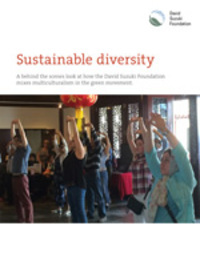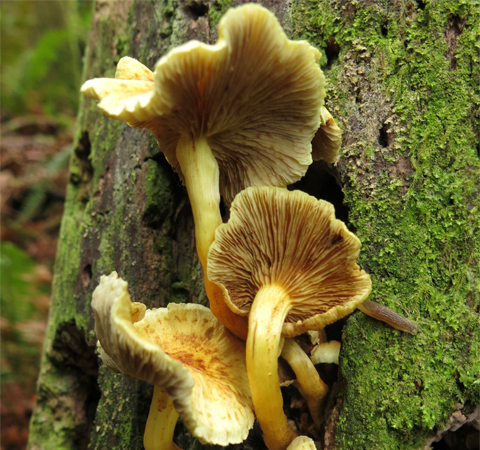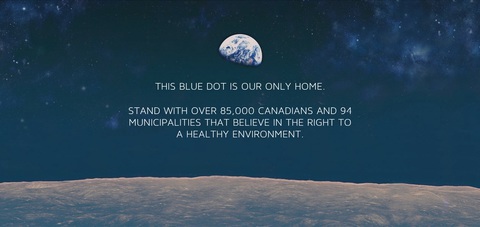David Suzuki's Blog, page 51
November 11, 2015
24 Hours of Climate Reality: The world is watching, and you can too
On November 13 and 14, musicians, entertainers, climate experts and activists will come together to build momentum for strong action at the upcoming United Nation climate summit in Paris. The event, 24 Hours of Climate Reality and Live Earth: The World Is Watching, will be hosted by Climate Reality Project chair and former U.S. vice-president Al Gore. Broadcasts start at 6 p.m. Central European Time and continue around the clock for 24 hours. The program will highlight eight nations that can play a pivotal role in the upcoming UN negotiations: China, India, Philippines, Australia, South Africa, Brazil, U.S. and Canada. This historic event will bring millions of global citizens together to call on world leaders at the UN climate talks in Paris to take substantial steps with defined actions to solve the climate crisis.
The program will include appearances by Elton John, Jon Bon Jovi, Hozier, Walk the Moon and other world-renowned talent. The Canadian segment will be broadcast live from Calgary between 7 and 10 p.m. Mountain Time and will feature David Suzuki Foundation science and policy manager Ian Bruce. He's a former oil and gas industry geophysicist with more than a decade of climate policy and renewable energy activism experience. Bruce will speak about the effects of climate change in Canada and around the world as well as the opportunity Paris presents for our country to show global leadership by accelerating the transition to renewable energy.
Visit www.24hoursofreality.org to learn how you can watch the broadcast at home or on your mobile device. Please share with your friends on Facebook, Twitter, etc. The more people like you who engage with the broadcast, the stronger the message to world leaders will be.
Hey! Want more DSF? Join David Suzuki on Facebook

November 10, 2015
Manitoba's lake fisheries need improving
Monterey Bay Aquarium's Seafood Watch program released an assessment today recommending people avoid buying fish from Manitoba's three largest fish producing lakes -- Winnipeg, Manitoba and Winnipegosis.
Today's assessment, carried out by the seafood program SeaChoice, scored these lake fisheries at a level comparable to some of the most poorly managed fisheries in the world. The fisheries fell short in areas such as understanding of stock sizes and catch rates, lack of catch limits for some species, inadequate data, poorly regulated bycatch, non-enforceable multi-species quotas and absence of harvest control rules. As a result, many fish stocks have collapsed or are severely depleted.
The assessment was prompted in 2012 by the prevalence of freshwater fish for sale without sustainability rankings. "We started out thinking these fisheries would be ranked on the higher end of the spectrum, but quickly became aware of the fisheries management challenges," said Scott Wallace, senior research scientist with the David Suzuki Foundation and SeaChoice member.
Because of its large size, this is an important fishery for reform in Canada. The lakes make up about 80 per cent of freshwater fish mostly walleye, northern pike, lake whitefish and yellow perch coming from Manitoba. Manitoba's fisheries are spread over 300 lakes and some years they are as large as B.C.'s salmon fisheries. Some smaller fisheries, like the Waterhen Lake walleye and northern pike gillnet have Marine Stewardship Council certification, demonstrating that sustainable fishing practices are possible for larger Manitoba lakes.
"There is no reason why these lakes can't meet minimum standards including precautionary catch limits, improved reporting and publically available information," said Wallace. "A first step would be to offer more resources to the provincial fisheries' branch to improve fisheries practices for these three large lakes."
Fisheries Improvement Projects (FIPs), which bring the fishing industry, government, conservation groups, processors, distributors and retailers together to improve sustainability also offer a path to reform, said Wallace.
Manitoba's fish are sold in Canada and exported to U.S. markets and overseas. SeaChoice's major retailer partner, Federated Co-operatives Limited, carries large quantities of Manitoba lake fish and has made a commitment to source from sustainable fisheries. "Federated Co-operatives Limited (FCL) is committed to sourcing walleye and northern pike from sustainable fresh water fisheries. FCL encourages the Manitoba Lake fisheries to make a commitment to improve fishery management," said Lisa Sparrow-Moellenbeck of the Federated Co-operatives Limited.
"For many years, high-quality fisheries have provided food, recreation and jobs for generations of people living near and visiting Manitoba's lakes," said Tom Nevakshonoff, Manitoba's Minister of Conservation and Water Stewardship. "The review we are launching today will result in a science-based, comprehensive management plan to protect the fish stock and ensure resources are here today and maintained for generations to come. We understand that all Manitobans have a collective interest in the development of sustainable fisheries for years to come."
According to the Manitoba Government, the review will engage a wide cross-section of those with a strong interest in Manitoba's lakes and fisheries. Considerations will include further implementation of traditional knowledge, improved data and research, sustainable jobs, past assessments, best management practices from other lakes outside of Manitoba, and assessments of ecosystem health and the long-term connections to healthy fish populations. An initial report is expected by the summer of 2016, with the goal of having a long-term management plan for Manitoba's fisheries subsequently.
Media Contacts:
Lana Brandt, National SeaChoice manager
778.833.2954
info@SeaChoice.org
Scott Wallace, Senior Research Scientist, David Suzuki Foundation
778.558.3984
Hey! Want more DSF? Join David Suzuki on Facebook

Sustainable diversity

Public engagement is about relationship building. Five years ago, the David Suzuki Foundation's Climate Change Team embraced a new approach to this work.
Campaigners Winnie Hwo and Harpreet Johal were originally responsible for sharing climate messaging with the country's newest citizens, particularly Chinese and South Asian Canadians, and engaging them to help build a green future for the country.
Five years have passed, and Winnie and Harpreet's roles have evolved and expanded. Along with the many relationships they have built, they also have much to share.
Thanks to the support of the Vancouver Foundation, the Sustainable diversity report documents and analyzes key ingredients in the Foundation's public engagement initiatives with Canada's diverse communities. The report is not a formula for success, but it opens new opportunities, learning and questions.
As we release the 40-page report, the David Suzuki Foundation is also launching its first Sustainable Diversity Network.
Hey! Want more DSF? Join David Suzuki on Facebook

November 6, 2015
President Obama's Keystone XL rejection signals need for progress at Paris climate talks
VANCOUVER -- In rejecting the Keystone XL pipeline project, U.S. President Barack Obama has signalled that it's time for the world to shift away from dangerous fossil fuels.
"Ultimately, if we're going to prevent large parts of this earth from becoming not only inhospitable but uninhabitable in our lifetimes, we're going to have to keep some fossil fuels in the ground rather than burn them and release more dangerous pollution into the sky," the president said, noting that the U.S. must transition from fossil fuels to a clean energy economy and that the shift is occurring "more quickly than many anticipated." He also pointed to the many economic benefits of energy conservation and clean energy.
The David Suzuki Foundation has long argued that making the transition from dangerous fossil fuels to clean energy is good for human health, the environment, the economy and climate systems.
"The severity of climate change will not be determined by chance. It will be determined by the choices we make now," said David Suzuki Foundation science and policy manager Ian Bruce. "The scientific evidence shows we need to go beyond reducing carbon emissions to eliminating them within the next few decades."
The Foundation agrees with Climate Action Network Canada that a moratorium should be placed on all oil sands expansion and that a sustainable future requires energy conservation and a shift to 100 per cent renewable energy.
"We hope President Obama's decision will signal to Prime Minister Trudeau that it's time for him to support ambitious targets backed by an effective, legally binding plan in Paris to significantly reduce greenhouse gas emissions," Bruce said, adding that the strong Canadian delegation to the talks is a sign that Canada is serious about tackling the issue.
For information, please contact:
Ian Hanington, David Suzuki Foundation
778-871-1782
ihanington@davidsuzuki.org
Hey! Want more DSF? Join David Suzuki on Facebook

November 5, 2015
The many marvels of the mysterious mushroom

(Credit: Ian Hanington)
Until 1969, biologists thought mushrooms and other fungi were plants. They're actually more closely related to animals, but with enough differences that they inhabit their own distinct classification.
This and more recent findings about these mysterious organisms illustrate how much we have yet to learn about the complexities of the natural world. New research reveals mushrooms can even help plants communicate, share nutrients and defend themselves against disease and pests.
There's far more to mushrooms than the stems and caps that poke above ground. Most of the organism is a mass of thin underground threads called mycelia. These filaments form networks that help plants, including trees, connect to each other, through structures called mycorrhizae.
Scientists believe about 90 per cent of land-based plants are involved in this mutually beneficial relationship with fungi. Plants deliver food to the mushroom, created by photosynthesis, and the filaments, in turn, assist the plants to absorb water and minerals and to produce chemicals that help them resist disease and other threats. And, of course, a myriad of other life forms benefit from the healthy plants.
The structure and function of the mycelial networks and their ability to facilitate communication between physically separated plants led mycologist Paul Stamets to call them "Earth's natural Internet." He's also noted their similarity to brain cell networks. According to a Discover article, "Brains and mycelia grow new connections, or prune existing ones, in response to environmental stimuli. Both use an array of chemical messengers to transmit signals throughout a cellular web."
Research by Suzanne Simard at the University of British Columbia found that Douglas fir and paper birch trees transfer carbon back and forth through the mycelia, and other research shows they can also transfer nitrogen and phosphorous. Simard believes older, larger trees help younger trees through this process. She found that the smaller trees' survival often depends on large "mother trees" and that cutting down these tree elders leaves seedlings and smaller trees more vulnerable.
Researchers in China found trees attacked by harmful fungi are able to warn other trees through the mycelia networks, and University of Aberdeen biologists found they can also warn other plants of aphid attacks.
It all adds to our growing understanding of how interconnected everything on our planet is, and how our actions -- such as cutting down large "mother" trees -- can have unintended negative consequences that cascade through ecosystems.
Scientists are also finding that fungi can be useful to humans beyond providing food and helping us make cheese, bread, beer and wine. Stamets believes mushrooms can be employed to clean up oil spills, defend against weaponized smallpox, break down toxic chemicals like PCBs and decontaminate areas exposed to radiation.
He credits his interest in fungi to another fascinating aspect of many mushrooms around the world: their hallucinogenic properties. During college, Stamets spent a lot of time in the Ohio woods, where he first tried psilocybin mushrooms. They had a profound effect on him, and after his first experience, his persistent stutter went away. He later quit a logging job, because the work was destroying mushroom habitat, and began studying fungi at Evergreen State College in Olympia, Washington.
Since then, his research has led to fascinating discoveries of multiple possible purposes for fungi, including nuclear decontamination, water filtration, biofuels, increasing agricultural yields, pest control and medicines.
Research is also shedding light on potential benefits of the psychotropic properties of mushrooms, such as the 144 species that contain psilocybin. Indigenous people have long used hallucinogenic mushrooms for ceremonial, spiritual and psychological purposes -- and with good reason, it turns out. Psilocybin has been shown to improve the brain's connectivity. Researchers are finding the chemical can help combat depression, anxiety, fear and other disorders, and increase creativity and openness to new experience. This makes them potentially beneficial for post-traumatic stress, addiction and palliative care treatments.
We humans have made a lot of technological and scientific advances, and this sometimes gives us the sense that we're above or outside of nature, that we can do things better. Sometimes it takes a fascinating lifeform like a mushroom to shake us from our hubris and show us how much we have yet to learn about the world and our place in it.
Hey! Want more DSF? Join David Suzuki on Facebook

New federal cabinet a positive signal for science and environment
With today's cabinet appointments, Prime Minister Justin Trudeau has demonstrated a commitment to tackling issues related to climate change, ocean health, environmental protection and indigenous peoples, according to the David Suzuki Foundation. The Foundation is prepared to work with the new government to develop and strengthen policies around climate change, transportation, energy, ocean health, species and habitat protection and many other issues that are important to Canadians.
The recent election's spike in voter turnout is a signal that Canadians expect positive action on the issues that affect our health and well-being.
"We hope this new government will recognize the value Canadians place on the environment. If we all work together, we can strengthen the economy while protecting the natural systems we depend on for our health, prosperity and well-being," said David Suzuki Foundation CEO Peter Robinson.
Open and transparent governance and a commitment to sound science and evidence-based decision-making will ensure that Canada plays an important role on the world stage and remains a diverse and innovative country with a spectacular and healthy environment.
"This government was elected on an ambitious platform, and the new cabinet and ministries send a signal that they are ready to get started. Ministries like Innovation, Science and Economic Development; Environment and Climate Change; Infrastructure and Communities and a standalone portfolio for science are all good signs," Robinson said.
Robinson added that the United Nations climate negotiations in Paris, less than a month away, will present this government's first big challenge. "Canadians are counting on the new prime minister and environment and climate change minister to work with provincial leaders to develop strong climate policies that represent our national desire to take a leadership role on this critical issue. Canadians deserve nothing less."
Media Contact:
Alvin Singh
Communications Manager
604-250-2651
Hey! Want more DSF? Join David Suzuki on Facebook

November 3, 2015
David Suzuki Foundation recognizes Vancouver's green strategies leading the way to Paris
VANCOUVER, November 3, 2015 - With the United Nations climate summit just around the corner, the David Suzuki Foundation would like to congratulate the City of Vancouver on its bold approach to green and climate strategies. City council voted today in support of the Greenest City Action Plan update, which includes new priority actions to meet Vancouver's 2020 targets.
"We're excited to see the leadership on climate action shown today by Vancouver's city council," said Ian Bruce, science and policy manager for the David Suzuki Foundation.
"If the Renewable City Plan is also passed by council tomorrow, Vancouver will have firmly established itself as a municipal sustainability leader in North America. It's encouraging to see momentum building for action on climate at the city and regional levels, including in California, Ontario, Quebec and likely Alberta and B.C., in addition to national commitments," Bruce said. "Vancouver's green strategies deserve special recognition for their ability to transition the city towards an emission-free future that creates healthier communities and attracts innovation and clean technology and jobs in the process."
"The leadership and action taken today by the city of Vancouver to build the greenest and cleanest city possible has created a ripple that is being felt around the world - from Washington, D.C. to the Vatican. Vancouver's renewable energy wave is here."
Media contact:
Steve Kux
Climate and Clean Energy Communications Specialist
David Suzuki Foundation
604-374-4102
skux@davidsuzuki.org
Hey! Want more DSF? Join David Suzuki on Facebook

Join the Blue Dot movement

The Blue Dot movement is a comprehensive, multi-year campaign to support the groundswell of Canadians who want meaningful action to protect the people and places they love.
Read the PlanSign the Pledge
We have a plan to create lasting change for generations. Here's how:
Across the country, Canadians believe in our inherent right to a healthy environment - clean water, fresh air, safe food and a say in decisions that affect our health and wellbeing. One by one, people like you stand up to say this right should be recognized.
This growing movement of Canadians calls upon their local communities to pass municipal declarations respecting people's right to live in a healthy environment.
Community by community, this movement will inspire decision-makers across our provinces and territories to take notice.
With so many communities calling for action from all levels of government, the next step is to have our provincial and federal governments follow suit and pass environmental bills of rights.
Recognition in the Charter of Rights and Freedoms - the highest law in our country - is the final step toward protecting the right to clean air, fresh water and safe food for all Canadians. This ensures that we all benefit from a healthy environment, world-class standards and a say in the decisions that affect our health.
To learn more about the Blue Dot movement, visit bluedot.ca.
Blue Dot is backed by the David Suzuki Foundation, one of the most trusted environmental organizations in Canada. Together we are building a movement of millions of ordinary people taking extraordinary action to protect our right to a healthy environment and inspire the next generation of environmental leaders.
Hey! Want more DSF? Join David Suzuki on Facebook

Join the Blue Dot Movement

The Blue Dot movement is a comprehensive, multi-year campaign to support the groundswell of Canadians who want meaningful action to protect the people and places they love.
Read the PlanSign the Pledge
We have a plan to create lasting change for generations. Here's how:
Across the country, Canadians believe in our inherent right to a healthy environment - clean water, fresh air, healthy food and a say in decisions that affect us. One by one, people like you stand up to say this right should be recognized.
This growing movement of Canadians calls upon their local communities to pass municipal declarations respecting people's right to live in a healthy environment.
Community by community, this movement will inspire decision-makers across our provinces and territories to take notice.
With so many communities calling for action from all levels of government, the next step is to have our provincial and federal governments follow suit and pass environmental bills of rights.
Recognition in the Charter - the highest law in our country - is the final step in protecting the right to clean air, fresh water and healthy food for all Canadians. This ensures that we all benefit from a healthy environment, world-class standards and a say in the decisions that affect our health.
To learn more about the Blue Dot movement, visit bluedot.ca.
Blue Dot is backed by the David Suzuki Foundation, one of the most trusted environmental organizations in Canada. Together we are building a movement of millions of ordinary people taking extraordinary action to protect our right to a healthy environment and inspire the next generation of environmental leaders.
Hey! Want more DSF? Join David Suzuki on Facebook

November 2, 2015
Toronto cross-town bike lane could be a game-changer

(Credit: Second Avenue Protected Bike Lane via Flickr)
During the recent federal election, a candidate distributed flyers promising that, if elected, her party would make "historic investments in infrastructure".
"Infrastructure" can mean almost anything, of course, but after this vague language the flyer offered something concrete: "This means building cycling lanes and better public transit."
The transit pledge wasn't unexpected -- many politicians talk about that -- but her other promise was surprising and welcome. Among the dozens of issues a candidate can mention, this one chose bike lanes. Perhaps the world is changing.
This month the David Suzuki Foundation is launching a campaign to have bike lanes built in Ontario cities. It's all part of our effort to help folks spend more time outdoors, reduce traffic congestion, clear the air and cut greenhouse gas emissions.
Our first goal is getting a major bike lane on the main east-west corridor of Canada's largest city: Bloor Street and Danforth Avenue. We think it could prove a game-changer not just for Toronto but for municipalities across the country.
Toronto already has lanes on shorter streets, such as Adelaide in the downtown core, and they're proving very popular. Since bike lanes were installed on Adelaide in 2014, the number of cyclists has nearly tripled, from 550 to 1,575 over an eight-hour period. Jacquelyn Hayward Gulati, the city's cycling infrastructure manager, says people on bikes now represent nearly half (43 per cent) of traffic on this street. That's an extraordinary statistic, and one to remember when naysayers argue cycling could never move large numbers of people.
Now it's time to take this successful experiment and run it right across the city with a "cycle track" -- or protected bicycle lane -- on Bloor-Danforth.
The David Suzuki Foundation and its local partner, Cycle Toronto, are optimistic the project will come to fruition. The new federal government has promised billions of dollars for "green infrastructure", a bucket in which bike lanes should comfortably fit. The Bloor route is backed by six local residents' associations. And city staff are recommending approval of a pilot lane along Bloor, to be built in spring 2016.
As well, the project should garner support from drivers, especially elderly ones. The U.S. advocacy group People for Bikes says protected lanes reduce driving risks. Other experts point out that by clearly delineating spaces for cyclists and automobiles, the lanes make road use more predictable and safer for everyone.
The Bloor proposal comes in the midst of a growing belief that reliance on private motorized vehicles needs to be sharply curtailed. In Ontario, cars are now "the largest source of transport emissions", according to the province's environmental commissioner. The inactivity implicit in car travel is also harming our health: the Canadian Association of Physicians for the Environment says, "Each additional hour spent in a car per day is associated with a 6% increase in the likelihood of obesity." The growing popularity of cycling in Canadian cities shows that when you give people the opportunity to leave their cars at home, they will.
A Bloor bike lane is a great idea -- one that could spark similar projects across Canada. But not everyone at Toronto city council is embracing it. That's where you come in.
If you believe we need more bike lanes, please take a moment to express this to decision-makers by filling out the "Bloor Loves Bikes" pledge: https://www.cycleto.ca/bloor-loves-bikes-campaign-pledge.
It doesn't matter where you live: please fill out the pledge to build momentum for bike lanes and cleaner air throughout the country!
Hey! Want more DSF? Join David Suzuki on Facebook

David Suzuki's Blog
- David Suzuki's profile
- 247 followers



